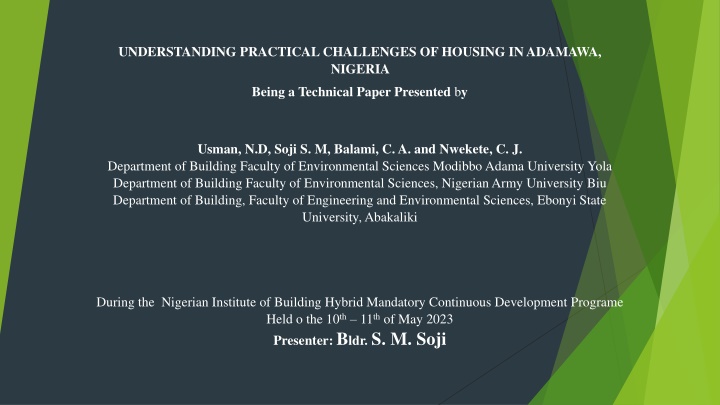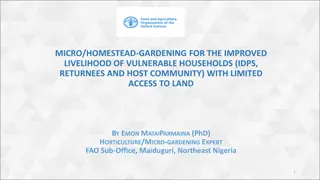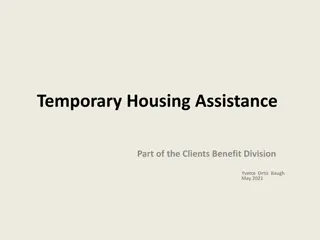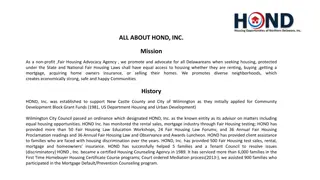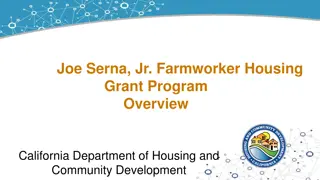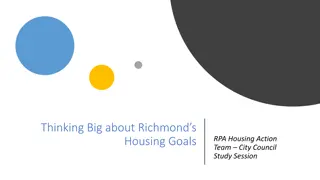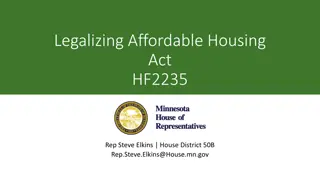Practical Challenges of Housing in Adamawa, Nigeria
This technical paper explores the practical challenges of housing in Adamawa State, Nigeria, focusing on factors such as lack of long-term funds, infrastructural inadequacy, and high costs of building materials.
Download Presentation

Please find below an Image/Link to download the presentation.
The content on the website is provided AS IS for your information and personal use only. It may not be sold, licensed, or shared on other websites without obtaining consent from the author.If you encounter any issues during the download, it is possible that the publisher has removed the file from their server.
You are allowed to download the files provided on this website for personal or commercial use, subject to the condition that they are used lawfully. All files are the property of their respective owners.
The content on the website is provided AS IS for your information and personal use only. It may not be sold, licensed, or shared on other websites without obtaining consent from the author.
E N D
Presentation Transcript
UNDERSTANDING PRACTICAL CHALLENGES OF HOUSING IN ADAMAWA, NIGERIA Being a Technical Paper Presented by Usman, N.D, Soji S. M, Balami, C. A. and Nwekete, C. J. Department of Building Faculty of Environmental Sciences Modibbo Adama University Yola Department of Building Faculty of Environmental Sciences, Nigerian Army University Biu Department of Building, Faculty of Engineering and Environmental Sciences, Ebonyi State University, Abakaliki During the Nigerian Institute of Building Hybrid Mandatory Continuous Development Programe Held o the 10th 11thof May 2023 Presenter: Bldr. S. M. Soji
INTRODUCTION Housing The Nigeria s population The Nigeria s Housing need Issues of overcrowding Previous Studies on challenges of housing in Nigeria Therefore, this article examines the practical challenges to housing in Nigeria with a view of proffering solutions to the existing problems.
PROBLEM STATEMENT Residential accommodation and public buildings are very scarce and even some government offices are still operating in rented houses. This scarcity of housing has pushed the cost of rented buildings very high as an average 3-bedroom flat rents between N200,000.00 N300,000.00 per annum and a duplex lets for between N500,00.00 N1,200,000.00 per annum in the three major towns (Choi, 2020). Obviously, these rents are not affordable to majority of the citizenry resulting in emergence of squatter settlements as alternative accommodation. This ugly situation still persists today and not much has been done by government to increase the housing stock in relation to demand for residential and office accommodations in the state especially. Hence, the need for this study to look at the practical challenges to the issues of housing in Adamawa State Nigeria
METHODOLOGY This paper used the review of literature approach. Usman, et al. (2021), advocates that exploratory design is carried out for either one or two purposes, namely; a preparatory examination of an issue for gaining knowledge or for data collection for appropriate application to an administrative or to solve issues. Exploratory survey can be used as stand-alone design because of its limited scope (Windapo, Oboirein, & Omeife, 2021) and at the same time, it could be used as a stand alone design when it is used to provide information (Usman, et al., 2021); Goel and Ramanathan (2017).
RESEARCH FINDINGS The study found that the following factors affect housing challenges in Adamawa State these include: Lack of Long-Term Funds Properties Approval and Title Paperwork Land Use Act Infrastructural Inadequacy High Cost of Building Materials Enforcing Foreclosure Nigeria Taxation System Construction Methods Construction Permits Issue Collaboration Issues
RECOMMENDATION Based on the findings from reviewed literature, five (5) principal components of sustainable affordable housing were identified. They are social, economic, environmental, institutional and technological components. These include the following; Social strategies of sustainable affordable housing Economic strategies of sustainable affordable housing Environmental strategies of sustainable affordable housing Institutional strategies of sustainable affordable housing Technological strategies of sustainable affordable housing
CONCLUSION In understanding the Nigerian housing challenges, it identifies the insufficiency of affordable housing in Nigeria and the frequency at which it is declining, it is progressively imperative to explore on sustainable solutions to improve this shortage and to integrate sustainability structures into the development of affordable houses. The article indicated that features of sustainability are not being encompassed in affordable housing schemes for Nigerians and that this shortage of affordable housing strength through sustainable approaches that are environmental, economic, social, institutional, and technical. Therefore, establishments and other building subdivision contributors in Nigeria must intensify public responsiveness of the housing perception by emphasizing its benefits. The Nigerian government should urgently incorporate and encourage technologies that are both economical and conservational for the construction of different type of new houses. In the same way, resolutions for sustainable housing in Nigeria need to be proposed.
REFERENCES Adedeji, I., Deveci, G. and Salman, H. (2022) The Incentives of Stabilized Interlocking Clay Bricks for Providing Sustainable Affordable Housing in Nigeria. Open Access Library Journal, 9, e9396. https://doi.org/10.4236/oalib.1109396 Alagbe, O.A ad Opoko, A.P. (2013) Housing Nigerian Urban Poor Through Self-Build Housing Concept Using Compressed Stabilized Laterite Bricks. International Journal of Research in Social Sciences. 2 (4): 13-18. www. ijsk.org/ijrss. Choi, E. (2020). The Effects of Municipal Policy on Green Building Designations in The United States. Ezeigwe, P. (2015). "Evaluation of the Causes of Housing Problems in Nigeria: A Case Study of Awka the Capital City ofAnambra State.," Journal of Economics and Sustainable Development 6 (20): 1-7. Ebekozien, A., Abdul-Aziz, A. & Jaafar, M. (2019). "Housing finance inaccessibility for low-income earners in Malaysia: Factors and solutions," Habitat International 87: 27-35. Federal Government of Nigeria (2004) National Housing Policy Draft, Abuja. Federal Government of Nigeria Report of the Vision 2020 National Technical Working Group on Housing, Federal Government of Nigeria; 2009.
Federal Government of Nigeria. Government White Paper on the Report of the Presidential Committee on Urban Development and Housing, Lagos, Government Printing Press; 2002. Ganiyu, B., Fapohunda, J. & Haldenwang, R. (2017). "Sustainable housing financing model to reduce South Africa housing deficit," International Journal of Housing MarketAnalysis, 10 (3): 410- 430. Gan, X., Zuo, J., Wen, T. & She, Y. (2019). "Exploring the Adequacy of Massive Constructed Public Housing in China," Sustainability 11: 1949 Goel, M. and Ramanathan, P. E. (2017). Business ethics and Corporate Social Responsibility - Is there a dividing line? Procedia Economics and Finance, 11 -59. Huang, J., Shen, G. & Zheng, H. (2015). "Is Insufficient Land Supply the Root cause of Housing Shortage? Empirical evidence fron Hong Kong," Habitat International 49: 538-546. Mulliner, E. & Maliene, V. (2015). "An Analysis of Professional Perceptions of Criteria Contributing to Sustainable HousingAffordability," Sustainability, 7 (1): 248-270. Murphy, L. (2016). "The politics of land supply and affordable housing: Auckland's Housing Accord and Special HousingAreas," Urban Studies, 53 (12): 2530-2547. Okonjo-Iweala, N. Unleashing the Housing Sector in Nigeria and in Africa. In 6th Global Housing Finance Conference; 2014.
Olanrewaju, A., Tan, S. & Abdul-Aziz, A. (2018). "Housing providers insights on the benefits of sustainable affordable housing," Sustainable Development, 26: 847-858 Ogunsanmi, O. (2013). "Stakeholders perception of key performance indicators (KPIs) of public private partnership (PPP) projects," International Journal of Construction Supply Chain Management, 3 (2): 27-38. Usman, N. D., Bustani, A. B., Igwe, C. O and Adamu, S (2021). Understanding Sustainability in Building Construction. A Technical Paper presented at the Nigerian of Institute of Building (NIOB) 51stAnnual General Meeting held in Lagos Nigeria 100 - 114 Windapo, A. O., Oboirein, M. O and Omeife, C. A (2021). Sustainable Construction Practices and Indicators: A Critical Review. ATechnical Paper presented at the Nigerian of Institute of Building (NIOB) 51stAnnual General Meeting held in Lagos Nigeria 11 - 20 Waziri, A.G. and Roosli, R. (2013) Housing Policies and Programmes in Nigeria: A Review of the Concept and Implementation. Journal of Business Management Dynamics; 3(2):60-68.
